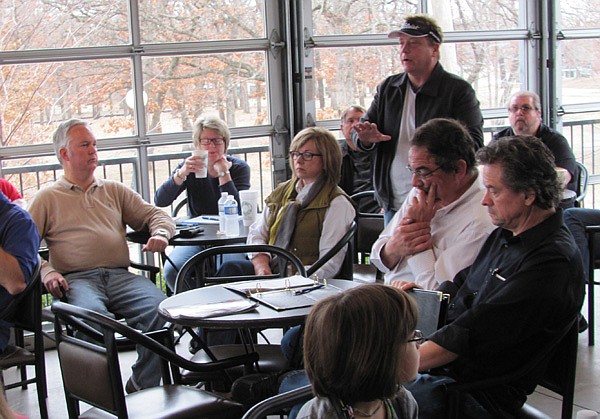FORT SMITH — Residents got a chance Saturday to air their views and have some of their questions answered about whether a prepared-food tax should be enacted to fund the Fort Smith Convention Center.
City officials and convention center backers were among 40 people who attended an informal 90-minute forum Saturday morning at Sweet Bay Coffee Co. at 3400 Rogers Ave.
One of the backers, George Moschner, who headed a committee that studied theissue last year, told the forum the ad hoc committee concluded the city should save the convention center and that the best way to do it was through a 1 percent preparedfood tax.
“We either have to fund it or board it up,” he said.
If the convention center closes, people in Fort Smith who need convention center space would have to go to Benton or Washington counties.
Several citizens at the meeting said they opposed another tax because it would intensify the effects of an already sluggish economy. One restaurateur said worsening inflation would make the situation even worse.
Another restaurateur said restaurant operators can pass along only so many expenses to its customers and that the food tax could hurt his business.
Fort Smith City Administrator Ray Gosack told the crowd that, if not the food tax, the only other source from which additional money for the convention center could come was the city’s $40 million general fund.
But he said there is little extra money in the general fund that could be spared for the convention center without cutting things like policeand firefighting.
Other money in the city’s $220 million budget for 2011 is spoken for. Money generated from sanitation and water and sewer fees, for example, can be used only for those purposes.
People at the forum pointed out that the convention center is not run as efficiently as it could be and is wasting money. Moschner and Fort Smith Advertising and Promotion Commission Executive Director Claude Legris agreed but said efforts would be made by the commission to make the convention center’s operations more efficient.
City directors have been looking for an alternative source of funds for the convention center since the expiration of a state turnback program last year that had provided about $1.8 million a year for the convention center over the last 10 years.
Legris said some of the tax money could be used to lower rental rates for local groups who may have trouble paying convention center fees.
One person brought up the fact that the prepared-food tax would generate $1.8 million a year but that the convention center’s deficit between revenue and expenses is only about $650,000. What does the commission propose to do with the rest of the tax revenue, she asked.
Mayor Sandy Sanders, who also serves as chairman of the commission, said some of the money would be used to buy the closed Flower Bakery nearby, demolish it and add much needed convention center parking.
Legris said the excess money would be used to make more improvements to facilities but also to help Fort Smith better compete with other convention center cities.
Some of the money could go to grants to help groups wanting to use the convention center. Legris said the commission gave a grant to a volleyball league to help with convention center rental costs. In turn, that league recently brought hundreds of people to Fort Smith for its three-day tournament that filled the city’s hotels and motels and its restaurants.
Gosack said the convention center generates about$20 million a year for the local economy.
Some residents have complained that the people should be allowed to vote on the prepared-food tax. Last week, the city directors voted themselves to institute the tax by ordinance rather than by election.
Gosack said the directors passing the tax by ordinance gives them more control over the tax because they could take action to modify or withdraw the tax without having to go to the expense of holding an election.
Also, if voters rejected the tax, city officials would have few, if any, alternative funding sources for the convention center.
Gosack said the city could not use the turnback funds for anything but the convention center. But having the turnback money allowed the city to use some of the revenue generated by the convention center, through rentals and fees, for other city uses, such as parks, libraries, construction of the community center at Martin Luther King Jr. Park and Area Agency on Aging services.
Northwest Arkansas, Pages 17 on 02/20/2011

